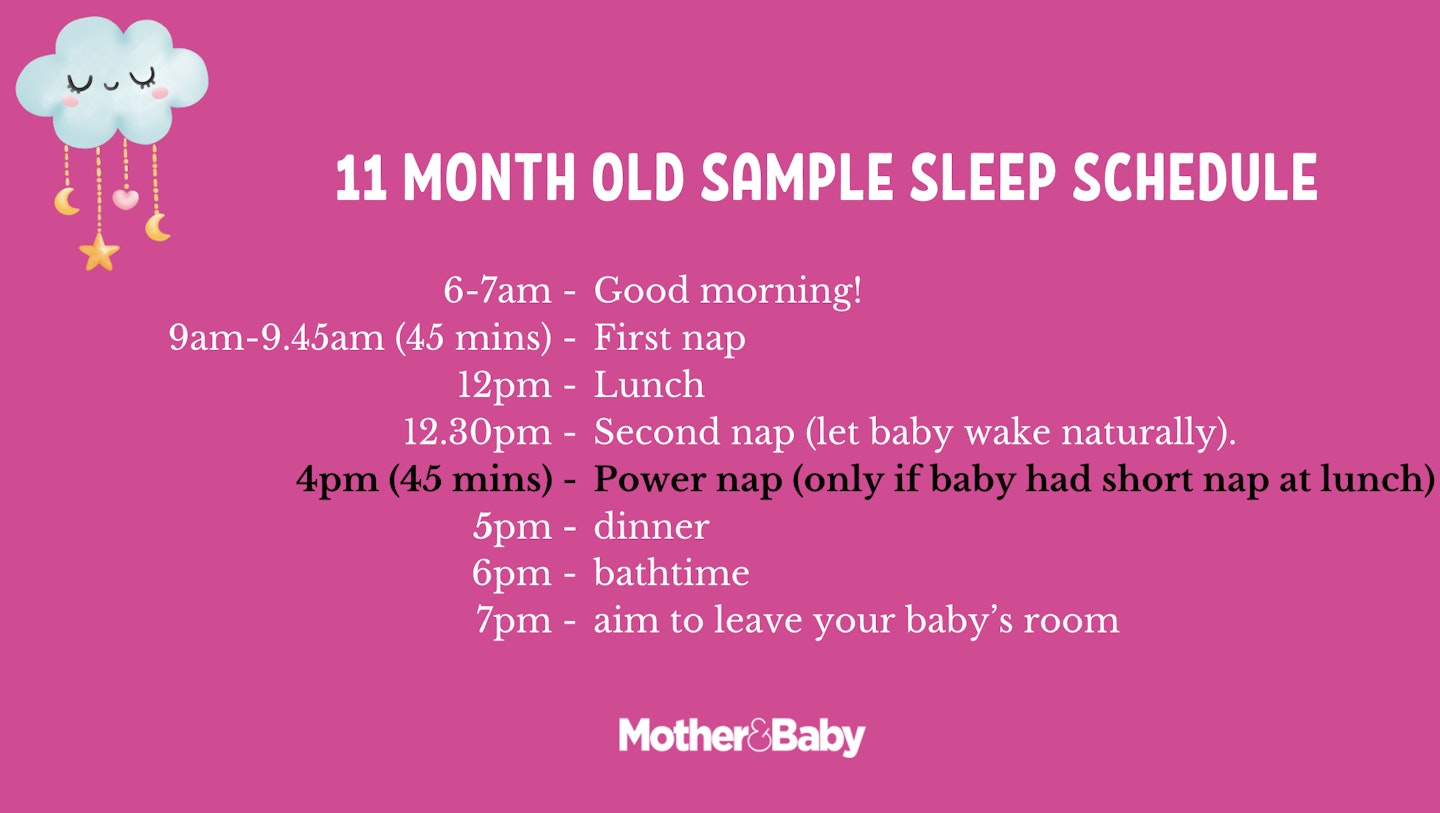
Medically Reviewed by: Cheryl Mackay
It's hard to believe your little baby will soon be celebrating their first birthday and entering toddlerhood. As your baby grows, they go through several changes and developmental milestones. While this is super exciting, it's not always fun for parents - especially if their sleep schedule is changing and keeping you up at night.
While some little ones will happily snooze through their daytime naps, others may fight it - but don't be fooled! 11-month-old babies still need their daytime naps and a solid nighttime sleep too. If you've not managed to nail down a good sleep schedule for your 11-month-old, now's the time. Sleep regressions are common around 12 months, (sometimes earlier) so it's best to be prepared.
Cheryl Mackay is a sleep and potty training specialist with over 30 years of experience. She explains that daytime naps are important, as what happens during the day will affect the night time sleep. "It’s like a puzzle, all pieces need to slot together for it to work! So if you crack daytime naps you will definitely have much better results at night."
How much should an 11-month-old sleep?
By the time your little one hits 11 months, they should be having around 13-14 hours of sleep per day. They'll get most of those hours at bedtime, and some little ones may end up sleeping a full 12 hours overnight - if you're lucky! Some may wake up once or twice during the night for an early morning feed. The rest of the hours, they'll make up during daytime naps.
How many naps should an 11-month-old take?
They should be having around two daytime naps - these can last anywhere from 30 minutes to two hours, depending on your baby. Remember that sleeping is important for brain development, but each individual is different and sleep schedules will also change if babies are teething or a little under the weather.
Getting them to take a nap around the same time every day will also encourage healthy sleep habits. "Keep nap times the same time each day as consistency is the key. Even if baby doesn’t sleep, some quiet time is just as good as you don’t want an overtired baby." Cheryl explains. You'll soon learn your baby's cues for nap time - some of the obvious signs include rubbing eyes, yawning, fussing, less engagement and generally becoming quieter. The sooner you pick up on their cues, the better your chances of getting baby to sleep.
"At 11 months I would give baby a power nap at 9am and wake after 45 mins. This nap is to see them through to the after-lunch nap. At this age you want to be focussing on the afternoon nap and slowly dropping the morning nap." She continues. "After lunch, this is when I would put baby down for a long nap. For this nap, allow baby to wake naturally - this sleep can be anything between an hour and a half up to 3 hours."
Sample sleep schedule for an 11-month-old
If your baby is struggling to get into a good sleep routine, this sample sleep schedule may help as a rough guide. It's worth noting that if your baby has had a long nap after lunch, they won't need the 4pm power nap and should be able to confidently go through to bedtime.

You can also help encourage your 11-month-old's healthy sleeping habits by:
• Sticking to a peaceful bedtime routine including bath and keeping the lights low.
• Giving them a short baby massage immediately after bath and just before bedtime.
• Delaying your response when your baby wakes up crying.
• No over stimulation before nap or bedtime.
• Starting a sleep training method.
• "Babies don’t work by time like we do, but they do work by association, so I would set up baby's room at nap time the same as you would for bedtime as they will then associate this with their time to sleep."
• "Try and let baby sleep at home in the cot as much as possible as this will make night time sleeps a lot easier in the long run."
Cheryl points out that you need to be consistent and confident in your behaviour as a baby can sense when you are unsure. She suggests a simple routine: "Nappy change, pop them back in their sleeping bag, give them a cuddle, put them in the cot awake (if you put your baby in the cot after being asleep on you, then when they wake and you are not there, this can be upsetting for baby). Reassure your baby while they are in the cot by stroking their hair, patting their bottom - this let's them know that even though they aren't in your arms, you are still there, and they are safe. Then leave the room. Allow your baby to settle while you are not there."
What is a good bedtime for a 11-month-old?
A typical bedtime at this age is around 13 hours after waking in the morning. So, if your baby wakes around 6.30am, then you'll want to get them ready for bed by 6.30pm -7pm latest. Try to stick to the same bedtime each night, bringing it any earlier or pushing it too late, can upset their routine and also yours.
Your 11-month-old should be having around 13-14 hours of sleep a day and this includes their daytime naps. Don't let them stay up too long between naps as once they're overtired, it can be hard to calm and soothe them. Ensure the preparation for nighttime sleep is calm and peaceful. If you have another toddler, try to keep them busy with toys while you but the little one to sleep.
Can an 11-month-old baby sleep through the night?
Yes! By this age, most babies can sleep through the night (hurrah!) However, stretching it to a full 12 hours may not always be realistic. Some may still need to wake for an early morning feed around 3am-5am but don't despair! This may actually help them sleep a little better during that last stretch saving you a really early morning wake up call. If they do wake at this time, try and keep the routine as calm and peaceful as possible.
Is there an 11-month sleep regression?
Yes, it is possible. Sleep regression usually happens between 8-10 months and 12 months and 11 months falls right in the middle, so some babies may experience it. However, Cheryl doesn't believe in sleep regressions and thinks it's just the baby getting older and needing a new routine. "As the baby gets older, I find it better to follow a sleep routine. With a routine, the baby will have nap times the same time each day and with this consistency they will wake up for the day roughly the same time each day making the daytime naps and bedtime go a lot smoother."
If your child does go through something that resembles a sleep regression, you can prepare yourself by getting your little one into a good sleeping habit for when it does. Sleep regression happens for a number of reasons:
Developmental milestones: Learning new skills, some babies could be learning to walk or pulling themself up so they'll be seeing the world from a different perspective. These developmental milestones are really exciting time for them and may stimulate them more so that may stay awake for longer periods at night.
Separation anxiety: Some babies may experience separation anxiety causing them to cry more or wait for a comfort from their parents.
Teething: Some 11-month-olds may experience teething discomfort - this can have a knock-on effect during sleep time.
About the expert
Cheryl Mackay is a childcare expert with 30+ years of experience and founder of Sleep Training London. As a qualified sleep consultant and gentle parenting specialist, she supports parents through sleep training, potty training, and behaviour management, offering compassionate and child-centred techniques.
About the author
Keya Modessa, is our Senior Digital Writer and brings over a decade of experience from the digital realm to Mother&Baby. As a mother of two, Keya understands the joys and challenges of modern parenthood and uses her own experience, to give practical advice. Keya has worked across national publications including glossy women's mags, Food and Travel, and more recently as digital lead for Muddy Stilettos.
